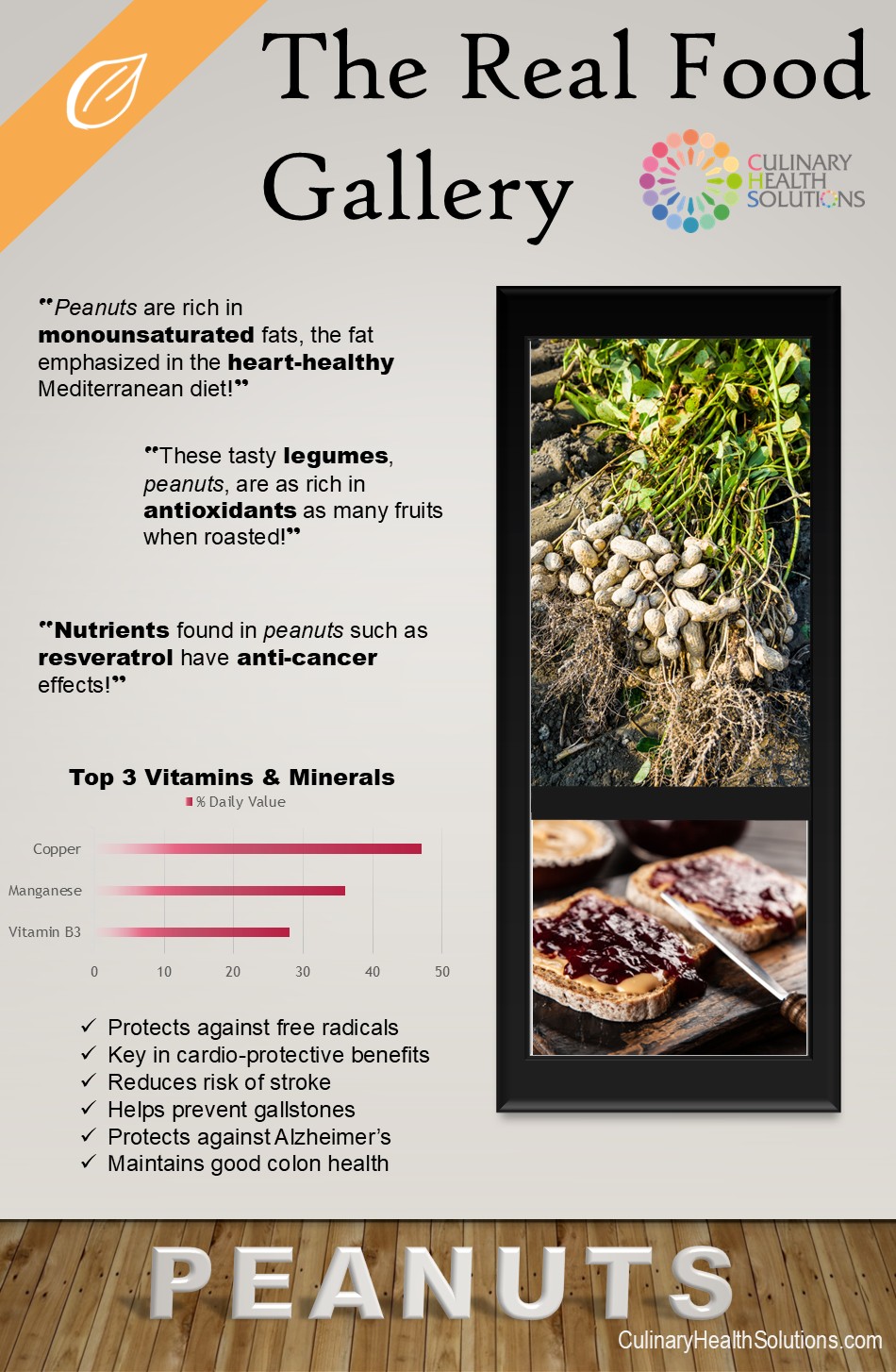Peanuts

In addition to being every kid's (and many grownup kid's) favorite sandwich filling, peanuts pack a serious nutritional punch and offer a variety of health benefits.
Peanuts are rich in monounsaturated fats, the type of fat that is emphasized in the heart healthy Mediterranean diet. Studies of diets with a special emphasis on peanuts have shown that this little legume is a big ally for a healthy heart. In one such randomized, double-blind, crossover study involving 22 subjects, a high monounsaturated diet that emphasized peanuts and peanut butter decreased cardiovascular disease risk by an estimated 21% compared to the average American diet.
In addition to their monounsaturated fat content, peanuts feature an array of other nutrients that, in numerous studies, have been shown to promote heart health. Peanuts are good sources of vitamin E, niacin, folate, protein and manganese. In addition, peanuts provide resveratrol, the phenolic antioxidant also found in red grapes and red wine that is thought to be responsible for the French paradox: the fact that in France, people consume a diet that is not low in fat, but have a lower risk of cardiovascular disease compared to the U.S. With all of the important nutrients provided by nuts like peanuts, it is no wonder that numerous research studies, including the Nurses' Health Study that involved over 86,000 women, have found that frequent nut consumption is related to reduced risk of cardiovascular disease. A number of studies have shown that nutrients found in peanuts, including folic acid, phytosterols, phytic acid (inositol hexaphosphate) and resveratrol, may have anti-cancer effects. A rich source all these nutrients—including the phytosterol betasisterol, which has demonstrated anticancer actions—peanuts have long been considered a likely candidate as a colon cancer preventive food. Colorectal cancer is the second most fatal malignancy in developed countries and the third most frequent cancer worldwide. In Taiwan, not only has incidence of colon cancer increased, but the likelihood of dying from the disease rose 74% from 1993 to 2002.
Taiwanese researchers decided to examine peanuts' anti-colon cancer potential and conducted a 10year study involving 12,026 men and 11,917 women to see if eating peanuts might affect risk of colon cancer. Researchers tracked study participants' weekly food intake, collecting data on frequently consumed foods and folk dishes such as sweet potato, bean products, peanut products, pickled foods, and foods that contained nitrates or were smoked. Risk of colon cancer was found to be highly correlated with both peanuts, which greatly lessened risk, and pickled foods, which greatly increased risk, particularly in women. Eating peanuts just 2 or more times each week was associated with a 58% lowered risk of colon cancer in women and a 27% lowered risk in men.
In women, but not in men, eating pickled foods 2 or more times a week more than doubled the likelihood of developing colon cancer risk for women, increasing their risk 215%.
Practical Tips: To help prevent colon cancer, avoid pickled foods, but enjoy peanuts at least twice each week. In addition to that old standby, the PB&J sandwich, try some of the following:
- Spread peanut butter on your morning waffle, whole grain toast or midmorning crackers.
- Add a tablespoon of peanut butter to your morning smoothie.
- Enjoy a handful of dry roasted peanuts with a glass of tomato juice as an afternoon snack.
- Combine peanut butter, coconut milk, and ready-to-use Thai red or green curry paste for a quick, delicious sauce. Pour over healthy sautéed vegetables. Use as a cooking sauce for tofu or salmon.
- Toss cooked brown rice with sesame oil, chopped peanuts, scallions, sweet red pepper, parsley and currants.
When purchasing peanut butter, be sure to read the label. Hydrogenated(trans) fats and sugar are often added to peanut butter.
Buy organic and choose brands that contain peanuts, salt—and nothing else!
